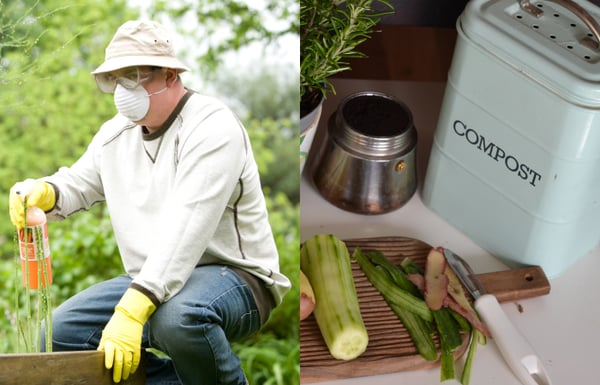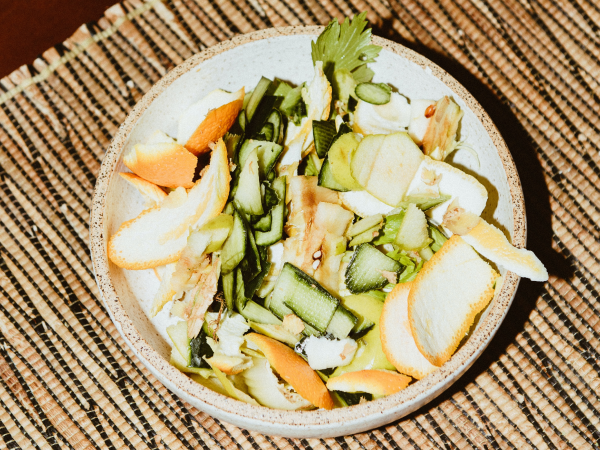
Homemade organic fertilisers for your garden
Keep your soil rich and your plants healthy by avoiding chemical fertilisers. We recommend four ingredients of homemade organic fertiliser you can use for your garden instead.
You’re growing your own fruit and vegetables. You’re eating free-range meat and eggs, and you’re investing in non-disposable products. You’re recycling, reusing, and thrifting. You’re making eco-conscious lifestyle choices to feel better - mentally and physically - but why stop there? If you want to go green all the way (especially if you're growing your food), consider your plants’ health and garden soil too!
The effects of organic fertilisers aren’t as immediate as chemicals such as pesticides. But unlike chemicals, they’re 100% natural, inexpensive, and significantly improve soil structure.
Chemical Fertilisers vs Organic Fertilisers
Organic fertilisers are naturally produced by animals or come from plants, and they improve your soil structure. In contrast, chemical fertilisers are composed of synthetic substances, and their purpose is to feed the plant. Chemical fertilisers don’t do anything for soil health.
Organic fertilisers are generally easy to come by. If you choose to DIY, it’s just a matter of throwing kitchen scraps together in a compost heap, leaving them for a few weeks, and then applying them to your garden soil. It’s a long process, but it’s worth it as you feed valuable nutrients back to the soil.
Share This Post
Using Kitchen Scraps As Homemade Organic Fertilisers For Your Garden
Organic fertilisers come in many forms. They can be liquid or dry, and you can buy organic fertilisers or make your own. While raw ingredients can be applied directly to your garden, the most effective organic fertiliser is a mixture of multiple raw ingredients, which form compost.
One important thing to remember: these ingredients need to decompose completely, otherwise their nutrients (undiluted and acidic) will overload the soil.
1: Banana Peels
Bananas are 42% potassium, one of the primary nutrients required by plants and soil. They also contain nitrogen, magnesium, and phosphorus, which are three other essential nutrients for soil health.
- Throw your banana peels into a compost heap and let them break down before applying the compost to your soil. This allows the peels to mix with other nutrients from the other compost components, and the result will be less likely to overload the soil.
2: Vegetable Peels
Potato peels, onion peels, cabbage, lettuce, and other vegetable scraps are critical components of a rich compost heap. For example, potato skins are loaded with potassium, while cabbage contains magnesium and potassium. Your soil needs these nutrients.
- Vegetable peels can take a long time to decompose. Yet, to be effective, they need to decompose completely. Toss them in your compost heap to form a rich mixture with other ingredients, and if you want to speed up the composting process: turn your compost regularly, make sure the mixture isn’t too moist, and ensure a good balance of nitrogen and carbon.
3: Coffee Grounds
Even your garden loves coffee! While some plants are more sensitive to caffeine (coffee grounds can inhibit the growth of certain plants) coffee grounds are rich in nitrogen, phosphorus, and potassium. Your soil will lap it up.
- As you would with banana peels, add your leftover coffee grounds to the compost heap.
- You can also apply them directly to the surface of the soil as mulch, where they’ll retain the moisture of the soil and strengthen its structure, but make sure to rinse them first so as to weaken their acidity.
4: Eggshells
Eggs are rich in protein and a staple in most meals. But once you’ve cracked, scrambled, and eaten them, don’t get rid of the shells! Eggshells are full of calcium (and also contain potassium) - this mineral can lower the acidity of your soil and prompt plant growth by strengthening plant cell walls.
- Avoid adding your eggshells directly to your soil. They take a long time to decompose, so will need some help. Rinse and dry your eggshells, then use a coffee grinder to grind them into a powder before tossing them into your compost heap to mix with other ingredients.
- You can also sprinkle this eggshell powder on the surface of the soil.









